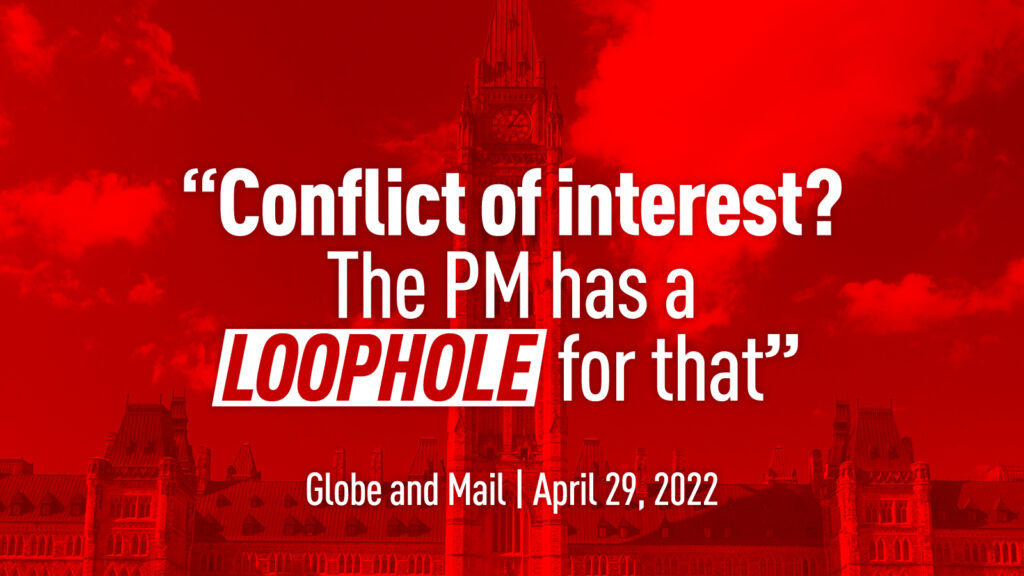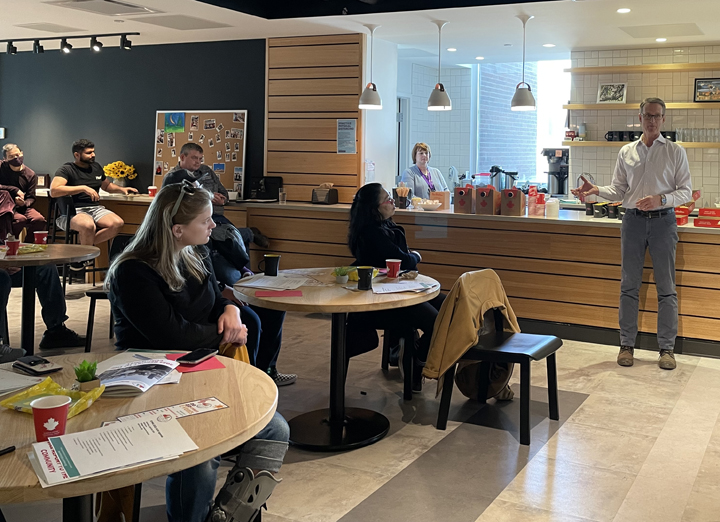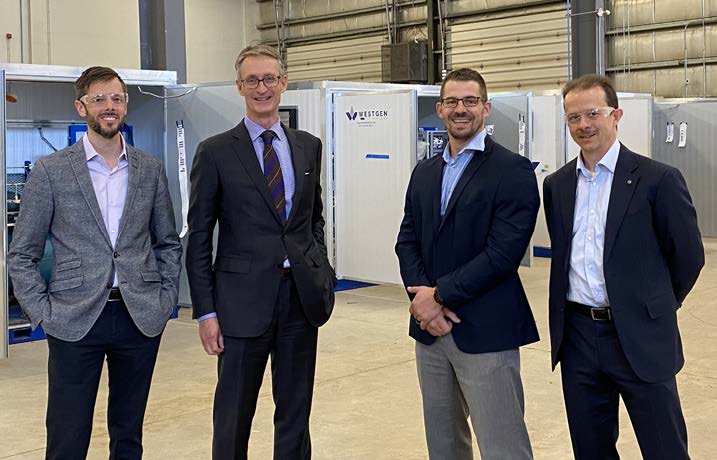E-Newsletter
May 5, 2022


There is much in the works in Canada’s Parliament, and the politics of division is continuing to take root, sadly.
May 4th was the most fractious day I have ever seen in the House of Commons. A Liberal back-bencher from Quebec impugned the integrity of my ten colleagues from Quebec, and indicated that they did not support the right of Canadian women to choose their own reproductive options. I know these members, and I know every one of them stands squarely with me in defending a women’s right to choose. The statement was posed during Question Period, and was clearly out of order. The floor of the House was a barrage of insults; yet the false narrative continued, and the Speaker of the House, in my opinion, should have ruled the non-question to be out of order.
We do not need to import the division of the United States into our politics in Canada. Any decision made in that country will not change our practices here. If anyone attempts to invite this issue into our Canadian practices respecting a woman’s right to choose, they will fail. It is a non-starter. And yet, the government seems to want to divide Canadians over the issue – including the construction of false narratives. This is a shame and, in my opinion, a distraction from the criticism of their obvious failings on so many files.
Government Funding Groups that Reinforce their own Narrative
If you’ve been watching my work in Parliament, you know that I’ve been busy in the House of Commons and in the Natural Resources Committee, as well as other committees, where I am asked to question witnesses that are cycled through for input on ‘studies’ performed by these committees. It is sometimes informative, but I find there are numerous ‘rent-seekers’, as I say, who consistently appear before parliamentary committees to give their take on the government’s direction. As slanted as some of that input will be at times, it’s even more difficult to go through the paces with these organizations when they have been funded by the government for the sole purpose of providing this information. It is propagandist, and there is always a clear self-interest.
There is no better display of this than the numerous environmental groups this government uses to foster its ‘shut down the productive economy’ message. Because, of course, if something is worth doing in this country, surely the government would already be funding it.
And I do find this Liberal government’s talk on the environment clearly disconnected with reality, and also with the government’s ability to deliver on any of the plans put forth.
So, it was a relief to have good company in that assessment this past week, from an Officer of Parliament – the Commissioner of the Environment and Sustainable Development, Jerry V. DeMarco. And his review of the government’s words vs. attainable actions confirmed this government’s inability to deliver. You will read some of this later in this newsletter.
Liberals Spreading Misinformation – About Me
Finally, I note that I must be having an impact in my interventions in Parliament. Two Ministers in the government have started circulating misinformation about me. The Minister of Housing has stated in the House that my position on foreign influence in the Canadian housing market is exactly the opposite of what I have represented. This, after their flip-flop to my position in this year’s budget address. Yes, I believe foreign money laundering is part of the cause of Canadian housing price inflation. And the Liberal government has chosen not to address this matter for too long. And the Minister of Crown-Indigenous Relations has broadcast that I helped fund the trucker rally in Ottawa. I assure you all this is not the case.
I believe politicians should not be in the practice of spreading misinformation – and I wish we held our public officials to account on this.

Commissioner of the Environment and Sustainable Development – Report to Parliament
Five reports were released to Parliament. I want to point out two of the five in particular in this issue, for the sake of brevity:
- The Potential of Hydrogen
- and the so-called “Just Transition” to a Low Carbon Economy (the Natural Resources Committee is currently undertaking a study on this subject)
On the “Just Transition”, the Commissioner found that:
“The audit found that there was no federal implementation plan, formal governance structure, or monitoring and reporting system in place to support a just transition and that supporting legislation has been delayed.”
My party and I have been advocating for a sensible environmental plan that balances emissions reductions with our strengths in clean, ethical natural resource development:
- Hydrogen development, in areas where it effectively reduces emissions
- Nuclear, including Small Modular Reactors, to reliably supply the demand for electricity that will be required in a lower-emissions economy
- Support for the many innovative technologies to Capture, Utilize and Store waste carbon (CCUS), many of which are being developed right here in Alberta
- Recognition that Canada can contribute globally by replacing unethical fuel from irresponsible countries with cleaner, responsible oil from Canada
- Recognition that Canada can also contribute globally by supplying clean LNG fuel to replace coal burning in many countries (not to mention, in today’s unstable world order, to replace oil and gas supplied by tyrants using the proceeds to wage war).
Oil and gas will be in demand around the world for decades to come. Canada is the world’s choice to supply transparent, environmentally-advanced energy solutions – and the source of the world’s energy from the perspective of international security is finally becoming understood once again. Far better that the world use Canadian oil and LNG, with our responsible environmental and human rights practices, than buy from countries that flare methane, dump waste into oceans and rivers, abuse workers, and use the proceeds to fund wars against their neighbours. The demand is not going away. The question is who will supply that demand.
One of Canada’s greatest contributions to emissions reduction will come from supplying responsible oil and LNG to replace coal. China alone is building 43 new coal plants, the most recent approved in February; and is also supporting coal plant construction in several other countries. How much better for the world if, instead of building more coal burning plants, Canada could export its abundant, cleaner LNG? Let’s acknowledge that the world does not have access to Canadian LNG because of the hurdles presented by this government. In that respect, we have failed. There is no emissions dome over Canada.
Australia and the US are far ahead of Canada in developing clean LNG alternatives. Replacing a coal plant with LNG reduces emissions by 50% immediately. This is a huge contribution to reaching emission targets. Canada needs to refocus to not only contribute to reducing global emissions, but also to provide clean, well-paying jobs for Canadian workers and the communities they live in. Offshoring of our consumption is not working for the world’s environment.
A few years ago, Canada had 14 LNG proposals on the table. Today, thanks to government attitudes that constrain investment and create uncertainty for investors, one is under construction, and a second smaller project’s proponents just decided to proceed. That is a significant policy failure on both the environmental and the job creation files.
The So-Called “JUST TRANSITION”
The Natural Resources Committee has been studying the government’s plan to transition oil and gas workers, and the communities that rely on these industries, to a lower emissions economy. We have already discovered that the so-called “plan” is incredibly unrealistic and vague. Somehow, 170,000 oil and gas industry workers are going to get 160,000 “green” jobs, which will pay them more than their current jobs, and this is supposed to add up.
It only works in the government’s estimation because those “green” jobs are going to be highly subsidized by the taxpayer because they aren’t actually sustainable jobs. That means you and I will pay more in our taxes to fund these imaginary jobs – which no one can actually describe anyway.
The Environment Commissioner has seen through this haze. In addition to the quote above, he says,
“When it comes to supporting a just transition to a low-carbon economy, the government has been unprepared and slow off the mark. We found that as Canada shifts its focus to low-carbon alternatives, the government is not prepared to provide appropriate support to more than 50 communities and 170,000 workers in the fossil fuels sector.”
The audit looked at the coal phase-out as the first of several transitions, and found it inadequate. The transition was handled on a “business as usual” basis relying on existing support programs such as Employment Insurance. The Commissioner found these programs are not sufficient to meet the needs of workers being phased out, or the communities that rely on those workers with real jobs. He also found the support programs did not measure, monitor or report on outcomes, so the department could not understand and report on its progress (or lack thereof), let alone plan for better outcomes as additional transitions roll out.
I have been pressing for detail on those imaginary new jobs, and how they will be sustained, at the Natural Resources Committee. In this clip, we are talking about 800,000 jobs lost in total, across several industries, to be replaced by 640,000 subsidized jobs. I am questioning a spokesperson for the Department of Natural Resources who seems ill-informed about hard numbers.
FAILURE on the HYDROGEN FILE
Hydrogen is a key element of a lower carbon economy. It will also have economic benefits, especially here in Alberta where natural gas, the source element for hydrogen, is available abundantly.
The Liberals claim to be fond of hydrogen, but as usual, they are unrealistic in estimating the impact that it can have on their climate change plans. The Commissioner says,
“[The department] overestimated hydrogen’s potential to reduce greenhouse gas emissions because unrealistic assumptions were used. For example, the hydrogen strategy assumed a low price for electricity, the adoption of aggressive and sometimes nonexistent policies, and an ambitious uptake of new technology.”
Canada will not meet its environmental targets – as it has yet to do – because it continues to be unrealistic in projecting what its policies can achieve. Again and again, we see narratives and double speak that is never supported by actual results.
In this case, the government couldn’t even agree with itself on what its projected outcomes would be:
“The audit found that Environment and Climate Change Canada estimated that the use of clean hydrogen technologies could produce the equivalent of a 15 megatonne reduction in emissions by 2030, while Natural Resources Canada estimated a contribution of up to 45 megatonnes in its ‘transformational’ scenario.”
I suppose if you have two different targets, it is easier to pretend you achieved your goals.
Unfortunately, according to the Commissioner:
“In our view, the assumptions in the federal hydrogen strategy are overly optimistic and compromise the credibility of the expected emission reductions.”
INSIDE PARLIAMENT
Some of this may feel like “inside the Beltway”, but how Parliament works does matter. In our democracy, we elect members of the government and we elect Opposition. The job of the Opposition matters – we are the ones that ask tough questions, investigate what’s really going on, scrutinize documents, and identify elements of the government’s plans that might have unintended or unwanted consequences. This work makes legislation and policy better.
But the Liberals, and Prime Minister Trudeau in particular, don’t like scrutiny and run from transparency. A couple of examples:
Emergencies Act: They refuse to provide the documents to the Commissioner that led to invoking the Emergencies Act, despite the Act’s clear provisions that the government’s decision must be evaluated by both a Parliamentary Committee and an independent Commissioner. They provided the Commissioner with a mandate that skirts the point of the exercise, which is to scrutinize the government’s decision (the mandate instead directs the Commission to scrutinize the truckers). They also manipulated the composition of the required Parliamentary Committee to avoid the required Opposition input.
Microbiology Lab: They have refused to provide documents to explain why two infectious-disease scientists were fired from the National Microbiology Lab in Winnipeg. Conservatives steadfastly refused to back down, so the new Liberal-NDP consortium has created a non-Parliamentary committee, which will have none of the investigative powers of a real Parliamentary committee.
When the government works this hard to conceal documents, you know there is something to be found.

Motion 11: The introduction of Motion 11 by the government is an affront to our democratic practices. Some may focus on the ability of the government to extend House of Commons sittings to midnight from now to the end of the current session (June) as being the crux of the motion – and I should note that my party is fine with extending sitting hours. But these rules, cooked up with the NDP coalition, allow the government to extend those sittings without any prior notice, and allow a Minister, at any time, without notice, to rise and recess the House of Commons until September.
During these extended sittings, the NDP-Liberal Members will not have to show up in the House of Commons because Motion 11 removes the constitutional requirement of quorum. To pass Motion 11, the Liberals imposed closure to shut down debate. At least you could say shutting down debate is consistent with the objective of the Motion.
Adjourning the House not only means public scrutiny like Question Period ends, but also means the work of the Committees is disrupted. Investigations stop. Questions stop. Examination of legislation stops. I suppose this is to thwart any potential weakness we are exposing in their approach to governance of the country, without having to ‘prorogue’ Parliament – as the Prime Minister did in the last Parliament, in order to avoid the scrutiny that was ensuing in the controversy over the attempt to grant a special, expensive program to ‘WE Charity’.
Mr. Trudeau does not like to be accountable for his decisions and actions. He has proven that he will take any step possible to remove himself from scrutiny. But this is not how Canada’s Parliament should operate. Citizens are not being well served.

MY RESPONSE TO BUDGET 2022
On April 27 I responded to Chrystia Freeland’s Budget 2022. It was a disappointing document.
At a time when inflation is running out of control, employment is rebounding, and the economy is recovering – this government still decided it needed to add $53 Billion to our $1.14 Trillion debt. That is despite $85 Billion in new revenues (many from the proceeds of inflation, and from higher commodity prices).
Perhaps embarrassed by that track record, they no longer use debt and deficit as the fiscal anchor to measure their performance. They prefer to use Debt to GDP Ratio, and claim Canada is doing well. But that measure is just deception. The government uses the GDP for the whole country, and then ignores all provincial debt in the calculation. As much as the measure is irrelevant, the government makes its measurement dishonest and irrelevant.
There’s more not to like. I spoke for ten minutes in the House. If you prefer to read the transcript, it is posted on my website.
AROUND CALGARY CENTRE
Here are some pictures from my work around Calgary Centre.

Thanks to the East Village Neighbourhood Association for hosting me at their 2022 AGM.

Ruth and I joined the Garayev family for a fabulous Iftar dinner during Ramadan.

An interesting local story: Methane (CH4) has a greenhouse gas intensity 26x greater than CO2. The impact is even greater because it is 85x as potent as CO2 over 20 years. In Canada alone, methane emissions from pneumatic
devices is equivalent to the CO2 emissions from 4,500,000 passenger cars! The WestGen Technologies’ EPOD products, based here in Balzac, are reliably generating power and reducing methane emissions in the harshest climates all over North America, from -45°C to +45°C. They are giving energy producers the tools to participate in the energy transformation, and allowing producers to operate in an ESG friendly manner. Local solutions for global challenges!
Please get in touch if there’s anything my office can do for you.
Greg McLean, M.P.
Calgary Centre
403-244-1880
Greg.McLean@parl.gc.ca
GregMcLeanMP.ca